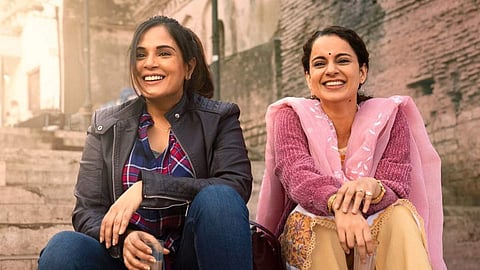

Over the weeks, I have written about several onscreen battles that women wage with the outside world. At times, it has been with patriarchy wearing the garb of culture. At times, it has been with sexism disguising itself as tradition. But we seldom speak of the inner conflicts of a woman, as she wanders between several identities not knowing which one to choose. The ones she wages against the ideal image she is asked to fit into. After all, how do you fight yourself?
Ashwini Iyer Tiwari places this battle against the backdrop of a sports drama in her latest film, Panga, starring Kangana Ranaut. While sports dramas usually have a villain in the form of an outsider, here, Jaya Nigam’s (Kangana Ranaut) biggest challenge is to convince herself that she can make a comeback. When she first meets Meenu (a spirited Richa Chaddha), who suggests that she could coach, Jaya says she doesn’t miss kabaddi. But she kicks her husband Prashanth (Jassie Gill) in her sleep, imagining her days on the field. Her eyes light up when she sees kabaddi players at her station, where she is a clerk.
Jaya settles though, burying her dreams by choice. When her child is born is with health complications, Jaya instinctively decides that she will become that parent, dedicated to taking care of the child. She quits kabaddi. There is no conversation, no compulsion. Later in the film, Jaya rejects an offer to play kabaddi for the Eastern Railways, as that would mean moving away from her family. “A mother can’t have dreams, Meenu,” she says. “If I do dream, I am cruel and selfish. All this big talk about women empowerment will vanish, ask them to do dishes and see their reaction.”
But did she ask? Who told her that this is how mothers should be? We often brush off the effect societal dictum has on our lives and perspectives. Isn’t that what mothers do? Let everything go for their child, live for their well-being. Quite interestingly, it isn’t just Jaya who is a product of social conditioning. The independent Meenu, a firebrand, finally decides she wants a piece of the marital bliss cliche herself. Prashant is conditioned too. He might cheer for his wife from the stands, but needs a moment to gather himself before he pushes her to chase her dreams. Ashwini roots all this behaviour in empathy.
She also smartly subverts most of the tropes of sports film in this story of second chances. Had this been another film, Jaya would have been fighting the world. But here, she is fighting herself at every point. Kangana brings out this dilemma with beautiful precision, balancing these emotions with the elegance of an experienced trapeze artist. There’s vulnerability, but strength too. The drive to achieve her dreams, but also guilt about leaving her family behind. Jaya resists when her son wants her to go back to kabaddi. “My age and waist can’t handle kabaddi,” she says, laughing. Later, when Meenu suggests a daredevil move, she refuses again. “I am a mom, I’ll break my bones.” She refuses to go to Kolkata because she believes that her husband and child can’t manage without her. It wasn’t her family, her husband nor her child that really stopped Jaya… it was the social conditioning.
This makes the climax only more poignant. As Jaya reaches out to touch the line in the final match, she only hears her doubts and overcomes them. Ashwini doesn’t stop there. She frees Jaya from her ‘duties’ and makes her family more independent. It’s apt that Ashwini ends the film asking us to take a ‘Panga’ for the Jayas in our lives. I feel that’s the biggest gift we can give them. After all, if Prashant and Adi can take care of themselves, then isn’t Jaya free to live her life, without guilt? What can be more empowering than that?